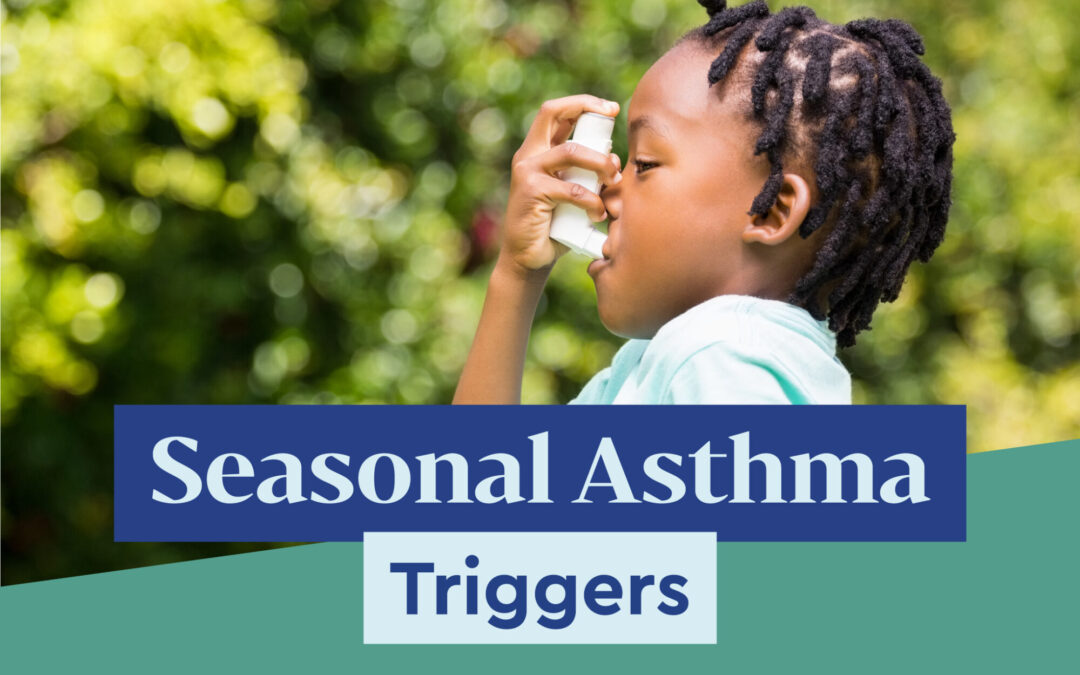Each season brings new risks for asthma patients. Here are some of the common triggers – and tips to help to manage them.
Need help? Schedule an appointment with CareWell Health Medical Group at 973-266-8416 or visit CareWell Health’s Emergency Department for respiratory emergencies.
Suffering from asthma? You’re not alone. According to lung.org, asthma affects 24.8 million Americans. And asthma can be harder to manage at different times of the year, because each season affects asthma patients differently. Factors like air temperature, humidity, and pollen can all impact those suffering from respiratory conditions. Some studies even suggest that climate change may be a cause of asthma as well.
Here are some common asthma triggers to watch for in each season – and some strategies to cope with asthma throughout the year.
SUMMER ASTHMA TRIGGERS & TIPS
- Trigger: Heat, Humidity & Pollen
The heat and humidity of hot summer days can lead to increased risk for asthma patients. That’s because humidity encourages the growth of asthma triggers like mold and pollen. With grass, ragweed, and other plants releasing their pollen, summer is a tricky season for asthmatics to navigate.
Tip: Taking asthma medication before going outside can help reduce the negative impact of pollen. - Trigger: Outdoor Activities
Outdoor summer activities can also cause some concern for people with asthma. Increased physical activity, such as bike riding or jogging, can trigger exercise-induced asthma. Even a leisurely swim can be an issue, since chlorine in pools may be a trigger for asthmatics.
Tip: It is important to pace yourself during exercise, and be sure to drink plenty of water. - Trigger: Smoke
Summer is the season for fireworks, grilling, firepits, and campfires. These are all fun activities, but they also contain a very common asthma trigger: smoke. Particles from smoke irritate sensitive airways – which can quickly spoil the fun for an asthma sufferer.
Tip: When possible, stay in a well-ventilated area, and avoid being in the direct line of smoke. Wearing a mask (we all have them now) can also help.
FALL & SPRING ASTHMA TRIGGERS & TIPS
- Trigger: Pollen
While temperatures are usually milder during spring and fall, there are still asthma triggers out there. Pollen is a very common one: it creates foreign particles in the air that can irritate the lungs when inhaled. This can be especially difficult for people who suffer from allergic asthma.
Tip: Taking allergy or asthma medication before you venture outside may help. (Check with your doctor first.) - Trigger: Rain
Even rainy days can trigger asthma. Why? Thunderstorms can actually break up pollen particles – and those smaller particles are even easier to breathe in. On top of that, higher humidity also helps mold and other allergens grow.
Tip: Limit your time outdoors during rainstorms. - Trigger: Changing Temperatures
The rising and falling temperatures during these in-between seasons are yet another cause for concern. Both cold and hot air carry risks for asthma patients, and swinging between temperatures during these seasons is hard to anticipate.
Tip: Check the weather ahead of time to come up with a plan to handle your time outside.
WINTER ASTHMA TRIGGERS & TIPS
- Trigger: Cold Air
Cold air is the #1 outdoor asthma trigger in winter. Dry and cold air shrinks your airways in a process called bronchoconstriction – and that makes breathing more difficult. This is especially important for people with exercise-induced asthma, since exercising outdoors in winter means inhaling a lot of cold air. This includes outdoor sports like skiing or snowmobiling.
Tip: Limit your time outdoors, and wear scarves or winter masks to warm the air before it enters your lungs. - Trigger: Wood Burning
Asthma sufferers should also be careful indoors during the winter. ‘Tis the season for cuddling by the fireplace, but smoke can definitely trigger asthma. That includes smoke from wood-burning stoves, cooking, etc.
Tip: When possible, choose smokeless heat sources – or at least keep wood burning to a minimum. - Trigger: Indoor Air Pollution
During the winter, we spend more time indoors – and indoor air pollution can make air harder to breathe for asthmatics. Many factors can contribute to poor indoor air quality. Here are just a few:
– Mold
– Pet dander
– Secondhand smoke
– Dust (and dust mites)
– Bacteria & viruses
Tip: Keeping a clean home may ease these triggers. Regular sweeping and dusting, checking for mold, and not smoking in enclosed spaces (or at all) can help.
What Can I Do To Stay Safe?
Having asthma doesn’t have to keep you from enjoying the different seasons. Staying prepared, being aware of your surroundings, and knowing the early symptoms of an asthma attack can help keep asthma under control.
Always carry your asthma medication (inhaler, pill, etc.), and don’t be afraid to use it if the following symptoms arise, as directed by your doctor:
- Shortness of breath
- Increased mucus production
- Coughing or wheezing
- Swelling in the airways
- Tightness in the chest
Not sure what your triggers are? We can help identify common triggers and come up with a treatment plan for your lifestyle!
Schedule an appointment with CareWell Health Medical Center at 973-266-8416 today – so you can start breathing easier.

